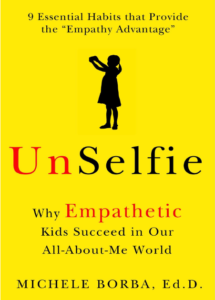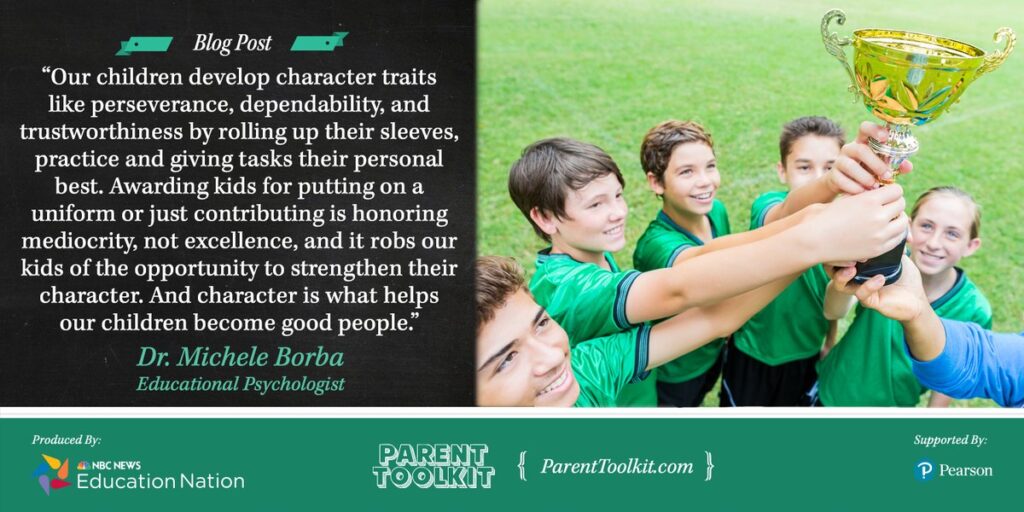Just pretend: The sports season just ended and you and the other parents are bursting with pride watching each child receive a participation trophy with their teammates. Of course, we hate to see our children disappointed, so when we notice every kid holding a golden statue, we utter a collective parent sigh: “Oh, good, they all feel special!” Phew!
But do our good intentions really help our kids? Not if we really want to nurture our children’s character and base our parenting on solid child-development research.
The “Every Kid Gets a Prize” is a staple of modern-day parenting. Even coaches and the sports industry are jumping on board. The local chapter of one national sports association spends roughly 12 percent of its yearly budget on trophies just to make sure that every kid feels special—even if it’s just for “showing up.”
But beware: our good-hearted trend may actually backfire and diminish-not nurture-our children’s self-esteem, character and resilience. Here are six reasons to stop the “Every kid gets a trophy” trend, and pronto.
Curtails Character Development
Our children develop crucial character traits like perseverance, dependability, and trustworthiness by rolling up their sleeves, practicing hard, and giving tasks their personal best. Awarding kids for putting on a uniform is honoring mediocrity-not excellence-and it robs them of the opportunity to strengthen their character. Character is what helps our children become good people and handle life.
Short-Changes Real-Life Preparation
Life is tough. Success is hard work. So truth be told: the real world doesn’t give out ribbons, medals, awards and trophies just for participating. Ask yourself: “If my child thinks that all she has to do is show up to earn the prize, what message does she learn?”
Let’s not allow our kids to believe that they can take the easy way out, cut corners, and rely on others to do the heavy hitting. Doing so won’t prepare them for the real world.
Robs “Authentic” Self-Esteem
In all fairness, a big reason many parents joined the “Trophy Bandwagon” is because they assumed that it would nurture their children’s self-esteem. But research tells a different story.
Authentic self-esteem is comprised of two parts: A Feeling of Worthiness (“I am a worthwhile person”) and A Feeling of Competence (“I am capable to handle life.”)
While that trophy may make a kid feel “special” in the moment, it doesn’t endure. Real self-esteem is gained from praise, pats on the back or trophies that are earned, and kids are quick to recognize they did nothing to warrant the award.
Curtails Resilience
Helping kids cope with adversity must be part of our parenting agendas. After all, life has bumps and our children must learning coping skills to ride them out.
Children become more tolerant to frustration when they are exposed to setbacks in small doses.That way when those bigger challenges come along they realize they can handle them.
Giving every kid a trophy as a means to cushion disappointment from not “being the best,” only reduces their chances to realize that they can bounce back and curtails their capacity for resilience.
Devalues Real Success
I’ll never forget when my college-bound son handed me a box of his trophies culled from being on dozens of teams. “They don’t mean anything,” he explained, “everyone has same trophies.” He saved just one medal from a team History Day competition that was well-earned from hard work and passion.
If every kid gets the trophy, then their “real win” isn’t special and they fail to reap the joy that comes from realizing that their hard efforts actually paid off.
It’s natural for parents to want to help their kids feel good, but what we may be missing is helping them care about others and support their teammates. The real world isn’t about “Me” but “We.” In today’s diverse, global world our children must learn to collaborate and support each other. And we must switch our kids’ from thinking, “I, me, mine,” to “we, us ours.” One way to do so is by encouraging them to recognize the strengths of others, and to congratulate their teammates for their talents. To prepare them for today’s world, we must help our kids think “WE,” not “ME.”
Let’s stop this craze of giving every kid a trophy just for showing up and breathing. The practice is not beneficial to children’s character development. Instead, tell your son or daughter that you are proud that they were a team player and that you loved going to those games or event.
Do snap that photo of your child, but make sure your son or daughter is in a group shot with all his or her teammates. Now there is the memory that both you and your child will want to preserve! And it’s also one of the best ways to raise a generation of kids who think “WE,” not “ME.”
Best!
Michele
 I’m an educational psychologist, former teacher, and authored 24 books including, UnSelfie: Why Empathetic Kids Succeed in Our All-About-Me World.
I’m an educational psychologist, former teacher, and authored 24 books including, UnSelfie: Why Empathetic Kids Succeed in Our All-About-Me World.
“Her thought-provoking and practical book may well tip over the parenting priority applecart – and rightly so.” – PUBLISHER’S WEEKLY (Starred Review)
“Michele Borba has written a game-changing guide showing why nurturing empathy in our children isn’t optional-it’s essential.” – PHILIP ZIMBARDO, professor emeritus of psychology, Stanford University
“Nobody on the planet is better than Michele Borba at showing you how to put empathy into action.” – JACK CANFIELD, coauthor of Chicken Soup of the Soul
This book offers a roadmap to a much brighter future.” – DACHER KELTER director of the Greater Good Science Center
“I have never, ever read a book that combines solid research on a timely and critical subject-the importance of promoting empathy.” – ELLEN GALINSKY, author of Mind in the Making.


